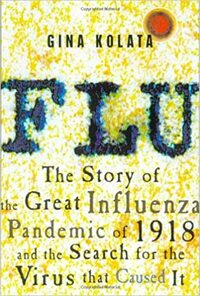You need to sign in or sign up before continuing.
Take a photo of a barcode or cover
92 reviews for:
Flu: The Story Of The Great Influenza Pandemic Of 1918 And The Search For The Virus That Caused It
Gina Kolata
92 reviews for:
Flu: The Story Of The Great Influenza Pandemic Of 1918 And The Search For The Virus That Caused It
Gina Kolata
Oh what a read in light of the pandemic we are living in now. I thought the first few chapters jumped around a bit, but it settles in about chapter four and I enjoyed the rest.
Excellent book and highly recommend it! There are some very interesting parallels with COVID-19 current events.
I enjoyed this book but it did not focus on the events of the 1918 flu. Mostly it was about the scientific hunt for the virus. I enjoyed this part but would have liked more of 1918 events.
challenging
informative
mysterious
reflective
sad
fast-paced
This book primarily focuses on people studying the 1918 flu in the 90s. There is very little about how the disease spread during and after WWI and how it affected people. The studies are interesting and it's amazing that scientists were able to tease virus fragments out of old tissue from flu victims, but I had expected more about what things were like in 1918.
The chapter about the attempts to immunize the entire country against flu in the 70s was informative but so, so boring. None of the scientists talked about there came to life in that story the way they did in other chapters.
The chapter about the attempts to immunize the entire country against flu in the 70s was informative but so, so boring. None of the scientists talked about there came to life in that story the way they did in other chapters.
This was interesting and I enjoyed it. Some parts of it dragged but others were page-turners. It was interesting to read in the middle of another pandemic, for sure.
informative
slow-paced
This book isn’t about the human toll of the Spanish flu. Instead, it’s about scientists searching to find the virus itself. It’s a fascinating read. Unlike a fiction novel, the book doesn’t have a nice, clean ending with everything solved. Scientists don’t know everything about the 1918 flu.
I read this book during the COVID-19 pandemic.
I read this book during the COVID-19 pandemic.
This book was very interesting in the beginning and end. I felt that you get bogged down in the middle of the book with diseases not connected to influenza and then the swine flu mishap. I also think the book went too in depth with the people connected to the study of influenza. I didn’t really see the point in knowing everyone’s life story and why they decided to study the flu. I also wish that there was a disclaimer that says that scientist do not know exactly why the influenza of 1918 was so deadly but have 2 very plausible theories.


